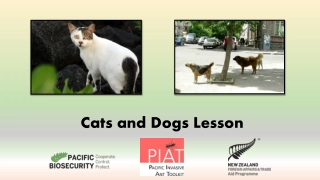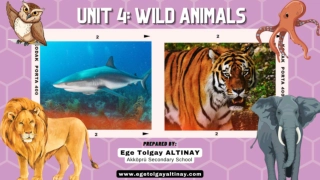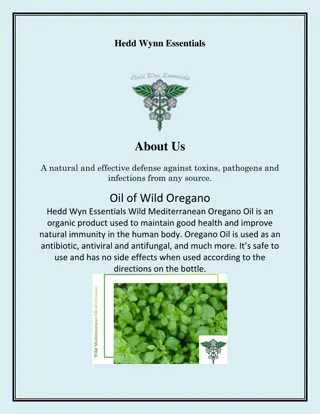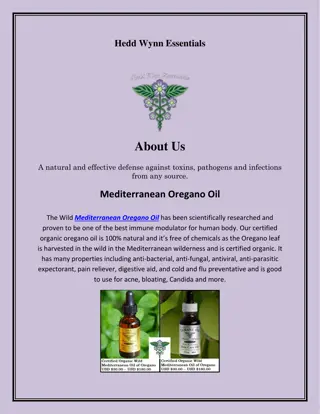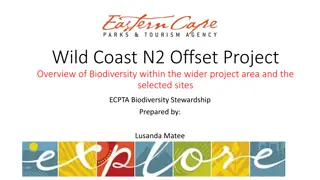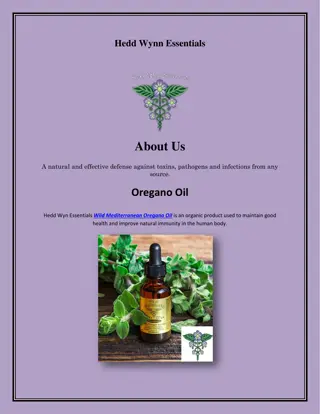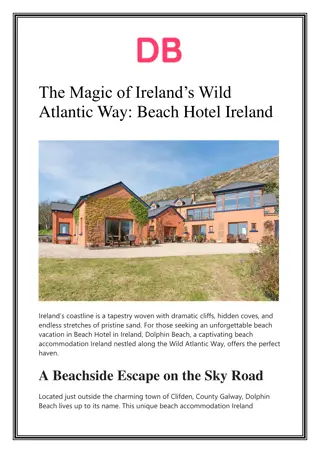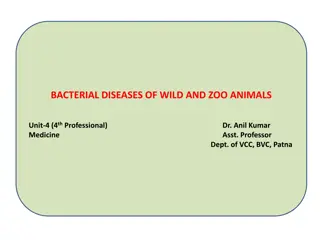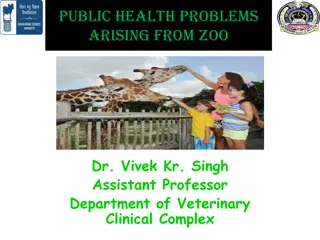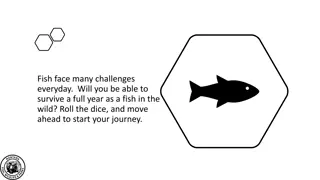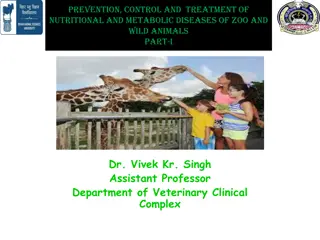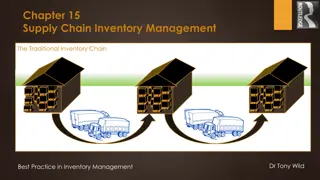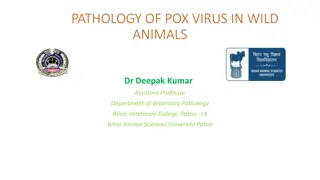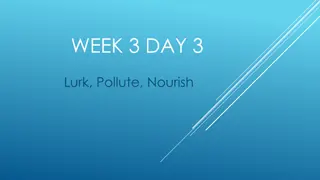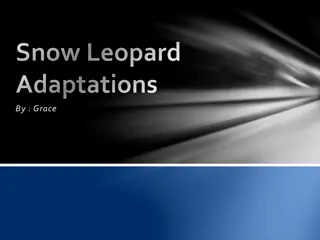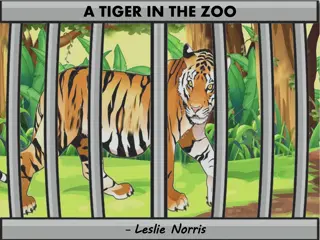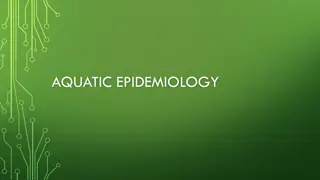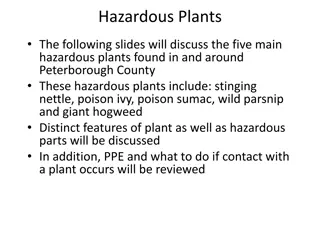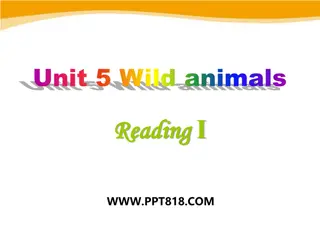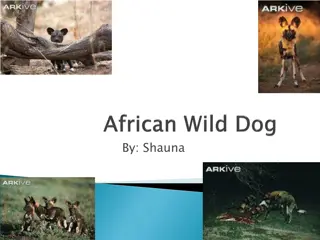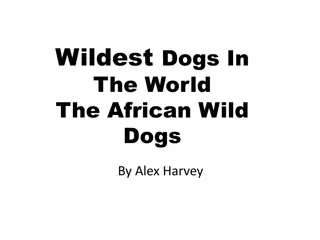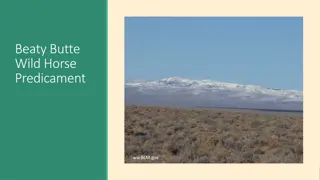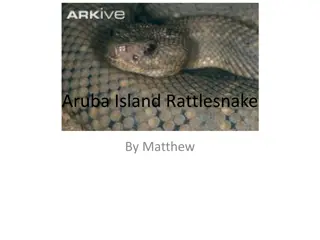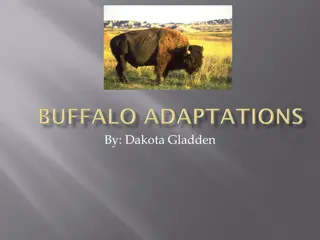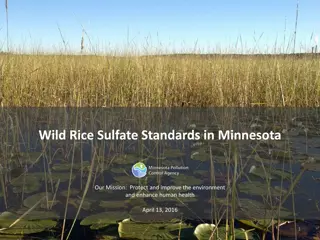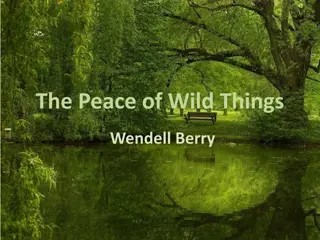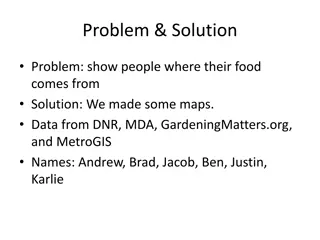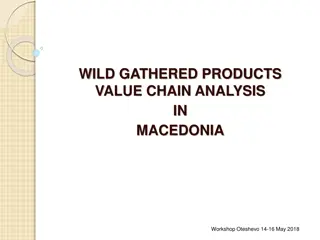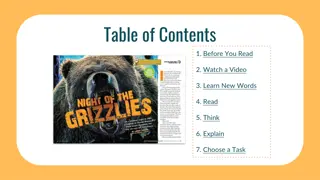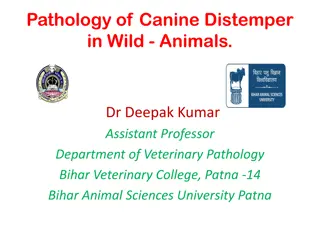Ode to the West Wind
Explore Percy Bysshe Shelley's iconic poem, "Ode to the West Wind," and delve into its allegorical message of reform and the poet as a catalyst for revolution. Discover the impact of the wild west wind on nature and the speaker's plea to be lifted and carried along with it. This presentation lecture
4 views • 13 slides
Unlocking the Secret to Healthy Locs: The Power of Wild Growth Hair Oil
Discover the transformative benefits of wild growth hair oil for your locs. Rich in essential nutrients, this potent formula nourishes the scalp, promotes hair growth, and strengthens locs from root to tip. Say goodbye to dryness and breakage as you unlock the secret to healthier, more vibrant locs
2 views • 2 slides
Cats and Dogs Lesson
Free-ranging cats and dogs pose various challenges to people, agriculture, and the environment. Originating from wild animals, these pets can become feral and cause harm by preying on native species, transmitting diseases, and creating public safety concerns. Responsible care and management are cruc
2 views • 12 slides
Explore the Fascinating World of Wild Animals and Their Habitats!
Journey through a visual encyclopedia showcasing a variety of wild animals such as bears, cheetahs, elephants, and more, along with information on different animal types like mammals, reptiles, and birds. Discover the diverse habitats where these creatures reside, from jungles and forests to deserts
0 views • 35 slides
Wild Oregano Oil, wildoiloforegano.com
It\u2019s safe to use and has no side effects when used according to the directions on the bottle. http:\/\/wildoiloforegano.com\/
0 views • 2 slides
Wild Mediterranean Oregano Oil, wildoiloforegano.com
Our certified organic oregano oil is 100% natural and it\u2019s free of chemicals as the Oregano leaf is harvested in the wild in the Mediterranean wilderness and is certified organic. \/\/tinyurl.com\/2bb5fas4
8 views • 2 slides
Wild Coast N2 Biodiversity Offset Project Overview
In 2014, SANRAL initiated the N2 Wild Coast Biodiversity Offset project to conserve biodiversity in selected sites along the Wild Coast region. The project aims to protect and promote the unique biodiversity of these areas without introducing new species or disrupting local communities. Through acti
0 views • 11 slides
Wild Berry Incense Wholesale - extrastrongherbalincense.com
High-quality materials and rich, aromatic smells are hallmarks of Wild Berry Incense. The benefits of buying Wild Berry Incense wholesale can be substantial, regardless of the size of your retail establishment\u2014from small boutiques to major chains. You not only save money, but you also guarantee
1 views • 7 slides
Alprazolam Pill Identifier - caretechpharmacy.com
High-quality materials and rich, aromatic smells are hallmarks of Wild Berry Incense. The benefits of buying Wild Berry Incense wholesale can be substantial, regardless of the size of your retail establishment\u2014from small boutiques to major chains. You not only save money, but you also guarantee
3 views • 9 slides
Wild Oregano Oil, wildoiloforegano.com
Hedd Wyn Essentials Wild Mediterranean Oregano Oil is an organic product used to maintain good health and improve natural immunity in the human body. http:\/\/wildoiloforegano.com\/
4 views • 2 slides
The Magic of Ireland’s Wild Atlantic Way Beach Hotel Ireland
Ireland\u2019s coastline is a tapestry woven with dramatic cliffs, hidden coves, and endless stretches of pristine sand. For those seeking an unforgettable beach vacation in Beach Hotel in Ireland, Dolphin Beach, a captivating beach accommodation Ireland nestled along the Wild Atlantic Way, offers t
2 views • 4 slides
Bacterial Diseases Impacting Wild and Zoo Animals: An Overview
Learn about anthrax, tuberculosis, and salmonellosis, three significant bacterial diseases affecting wild and zoo animals. Understand their etiology, hosts, transmission, diagnosis, prevention, and treatment to safeguard animal populations effectively.
0 views • 11 slides
Understanding Public Health Risks Associated with Zoos and Wild Animals
Zoos and wildlife parks serve as hubs for public recreation and education but can also pose public health risks due to potential transmission of zoonotic diseases by veterinarians who work closely with wild animals. Approximately 61% of infectious agents affecting humans are zoonotic in nature, with
0 views • 15 slides
Surviving the Wild: A Fish's Journey Full of Challenges
Enter the wild as a fish, facing various obstacles such as parasites, predators, and human interference. Roll the dice and navigate through different scenarios where your fate hangs on the outcome. Learn interesting fish facts along the way as you strive to survive for a full year in the unpredictab
1 views • 20 slides
Managing Nutritional and Metabolic Diseases in Zoo and Wild Animals
The prevention, control, and treatment of nutritional and metabolic diseases in zoo and wild animals are essential for maintaining their health. These diseases, such as rickets, osteoporosis, osteomalacia, and fibrous osteodystrophy, can result from imbalances in dietary nutrients and metabolic dera
0 views • 10 slides
Dr. Tony Wild's Best Practices in Inventory Management
Explore the traditional inventory chain and best practices in inventory management as detailed by Dr. Tony Wild. Topics include inventory location options, the 9-box model for annual demand, supply box structure, challenges in inventory management, and availability structure. Gain insights into inve
1 views • 15 slides
Overview of Epidemiological Cutoff Values (ECVs) in Antimicrobial Susceptibility Testing
Epidemiological Cutoff Values (ECVs) are crucial in determining antimicrobial susceptibility by distinguishing wild-type and non-wild-type microbial populations. ECVs are defined based on factors like minimal inhibitory concentration (MIC) and genetic variation, and are determined through specific m
0 views • 16 slides
Pathology of Pox Virus in Wild Animals by Dr. Deepak Kumar
Pox viruses can affect wild animals, with Monkeypox emerging as a significant zoonotic virus in Central and West Africa. The disease shows similarities to smallpox but is less severe. Pox lesions are characteristic signs of infection, and outbreaks have been documented in regions with a history of s
0 views • 16 slides
Understanding Lurking, Pollution, and Nourishment in the Wild
Exploring the concepts of lurking, pollution, and nourishment in the wild through images and examples - from jaguars camouflaging in the rainforest to the impact of human activities on the environment.
0 views • 19 slides
Snow Leopard - Amazing Adaptations and Behavior
Discover the fascinating world of snow leopards, known for their yellowish and grayish coat that provides camouflage in their mountainous habitat. With a population ranging from 3,500 to 7,000 in the wild, these majestic creatures exhibit unique characteristics such as a two-feet-tall stature and th
0 views • 6 slides
Exploring Humorous Techniques in Carolyn Wells' Poem on Wild Animals
The poem by Carolyn Wells humorously depicts the characteristics of wild animals, treating even ferocious beasts with a coat of gentle but weird humor. Through witty language and ironic twists, the poetess describes the different wild animals and their dangerous behaviors, highlighting the risks of
0 views • 12 slides
The Agony of a Caged Tiger - Poem Analysis
The poem "A Tiger in the Zoo" by Leslie Norris contrasts the confinement of a caged tiger with its natural habitat in the jungle, highlighting the agony, pain, and helplessness of the imprisoned animal. The poet vividly describes the majestic tiger's physical attributes and behaviors, emphasizing ho
1 views • 10 slides
Understanding Aquatic Epidemiology in Fish Populations
Aquatic epidemiology is a crucial branch of science that focuses on describing the health, diseases, and welfare of fish populations. It involves studying diseases in wild and hatchery-raised fish, identifying factors influencing disease occurrence, and conducting diagnostic investigations to mainta
0 views • 12 slides
Understanding Coevolution: An Example from Wild Parsnip and Webworms
Coevolution, a reciprocal evolutionary change in interacting species, can be observed in the relationship between wild parsnip plants containing toxic compounds and webworms that can metabolize these toxins. This example demonstrates the prerequisites for coevolution, including genetic variation and
0 views • 35 slides
Hazardous Plants Identification and Safety Guide
Explore the five main hazardous plants found in and around Peterborough County, including stinging nettle, poison ivy, poison sumac, wild parsnip, and giant hogweed. Learn about their distinct features, hazardous parts, symptoms of contact, and safety precautions. Discover how to identify these plan
0 views • 4 slides
Discovering Wild Animals: A Journey Through Fascinating Creatures
Delve into the world of wild animals through a captivating reading session featuring giraffes, bears, kangaroos, dolphins, elephants, squirrels, and giant pandas. Learn about their unique characteristics, behaviors, and the importance of conservation efforts to protect these magnificent creatures. E
0 views • 22 slides
Fascinating Facts About African Wild Dogs
African wild dogs, also known as painted wolves, are versatile animals found in mountain forests and deserts in Africa. They have a unique appearance with colors of black, gray, yellow, and white, and exhibit interesting behaviors like competing with hyenas and lions for food. These social animals l
0 views • 10 slides
Exploring the Fascinating African Wild Dogs
Dive into the world of African wild dogs through this report by Alex Harvey. Learn about their appearance, behavior, hunting habits, and more while discovering the intriguing life of these unique canines.
0 views • 8 slides
Beaty Butte Wild Horse Predicament and Conservation Efforts
Beaty Butte in Oregon faced a wild horse overpopulation crisis in 2015 due to heavy grazing exacerbated by drought. The Bureau of Land Management took action, gathering 1070 horses and implementing a capture, return, and fertility control program. Partnering with a training facility, they aimed to m
0 views • 5 slides
Aruba Island Rattlesnake Conservation Efforts and Challenges
The Aruba Island Rattlesnake, found in rocky hillsides and deserts, is endangered with only about 230 left in the wild. Threats include feral goats destroying their habitat and human activities like logging. Conservation efforts involve breeding in captivity and releasing them to increase their popu
0 views • 6 slides
Fascinating World of Buffalo in the Wild
Discover the intriguing world of buffalo in the wild through stunning imagery and insightful descriptions. These majestic creatures roam the plains, shedding fur in summer and weighing around 2000 pounds. Witness their natural habitat and herding behavior captured beautifully in these images.
0 views • 6 slides
Protecting Wild Rice in Minnesota: Sulfate Standards and Environmental Preservation
Understanding the importance of safeguarding wild rice in Minnesota due to its cultural, spiritual, and economic significance along with its sensitivity to sulfate pollution. Exploring sources of sulfate, the sulfate-sulfide relationship, and proposed solutions for maintaining wild rice populations.
0 views • 10 slides
Finding Peace in Nature: A Poetic Reflection
The poem "The Peace of Wild Things" by Wendell Berry reflects on finding solace in nature amidst despair and fear for the future. The poet seeks comfort in the serene company of wild creatures and tranquil waters, letting go of worries about the unknown. Through the beauty of the natural world, a se
0 views • 10 slides
Exploring Minnesota's Food Sources Through Interactive Maps
Discover where your food comes from in Minnesota through interactive maps created using data from various organizations. From wild rice in the wild to community gardens and farmers markets, these maps showcase the diverse sources of food in the state. Explore the green community gardens and yellow f
0 views • 6 slides
Wild Gathered Products Value Chain Analysis Workshop in Macedonia
This analysis delves into the value chain of wild gathered products in Macedonia, focusing on trends, market demands, and supply. It covers the collection trends, processing techniques, export values per product group like wild mushrooms and berries, and the export destinations mainly within Europe.
0 views • 29 slides
Fascinating Facts About African Wild Dogs
African wild dogs, also known by various names, are unique canids with a distinct genetic makeup. They are medium-sized with mottled coats and no dew claws, living in social packs where only the alpha pair breed. Each dog has a unique spot pattern, and they excel at hunting from a young age. Learn m
0 views • 14 slides
Uncovering Social Network Sybils in the Wild
Unveiling the presence of malicious Sybil accounts on large online social networks like Renren, this research delves into understanding Sybil behavior in the wild to enhance detection mechanisms. Leveraging ground-truth data on over 560K Sybils on Renren, a measurement-based real-time Sybil detector
0 views • 18 slides
Analyzing the Effective Use of Words in Describing the Wild Child Encounter
The passage describes Narsingh Singh's encounter with a wild child in the forest of northern India, highlighting vivid imagery and detailed descriptions to convey the setting and the appearance of the boy. By selecting powerful words and phrases, the author effectively creates a sense of mystery and
0 views • 7 slides
Exploring the Impact of Human Interaction on Grizzly Bears
Delve into the repercussions of human behavior on wild grizzly bears through a comprehensive journey from their historical depiction to present-day conservation efforts. The article prompts readers to question whether providing human food to wild animals is beneficial or detrimental, while also narr
0 views • 12 slides
Canine Distemper in Wild Animals - Pathology and Disease Overview
Canine distemper virus (CDV) poses a significant threat to various carnivore species, including domestic dogs, foxes, wolves, raccoons, bears, and others. This highly contagious disease has been linked to fatalities in lions and emphasizes the importance of understanding its pathology and impact on
0 views • 10 slides


